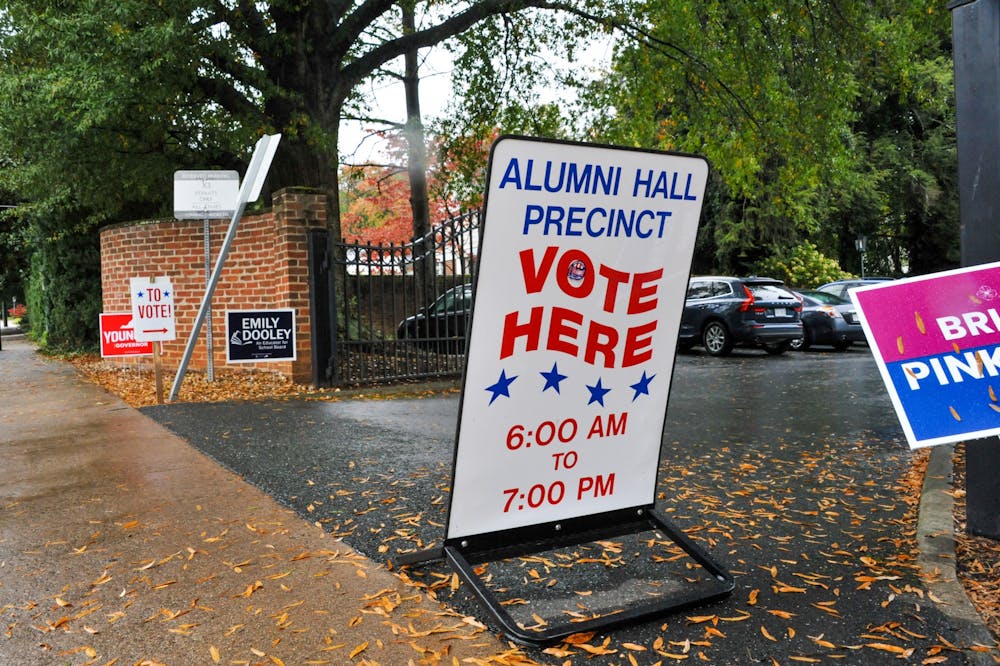Charlottesville’s political climate has been heating up as we draw nearer to primary elections. Del. Sally Hudson will challenge Sen. Creigh Deeds for the 11th District Democratic nomination for state senator. Voters will have to choose between two different visions for the Democratic party — one more progressive and new against one more moderate and long-standing within Virginia. For Gen Z, this race is indicative of a larger political moment — as we become a larger portion of the electorate, we have the capability to ensure our representatives change as our voices grow. By turning out to vote, we can signal whatever direction we think is best for our nation, prioritizing the ideas of people over party.
Young voters have the chance to pressure candidates to focus on the issues young people care about. In Virginia, 18 to 24 year olds make up 27 percent of the voting population. Our chance, however, continues to be wasted. In primary elections voter turnout is abysmal — only 8 percent of registered voters in Virginia voted in the 2021 primaries. In contrast, 54.9 percent of registered voters voted in the general election that year. This stark difference shows how little primary elections are actually valued.
One of the reasons primary elections are so valuable for voters, especially young ones, is because they encourage voters to evaluate platforms and think critically about which candidate will best represent them instead of simply voting down a party line. When a general election comes around, for example, there is one candidate from each party on the ballot. As of 2020, 78 percent of voters vote straight ticket — that is, people tend to vote on issues based on the beliefs of their party over their own personal beliefs. In a primary, this is not an option. Voters can and should understand what each candidate stands for, and pick the one that aligns more closely with their personal beliefs.
Thinking about which candidates align the most with your values is also critical in primaries because 90 percent of congressional races are decided in the primary election. That means roughly 391 out of 435 members of Congress are in their seats because of results in primary elections. If — like in recent Virginia primaries — less than 10 percent of the registered voting population actually voted in those primary elections, that means less than 10 percent of voters are getting to choose their representative. This undermines the power we have as citizens to choose the kinds of people we want in power, and it results in policies that don’t reflect the wishes of the people who the policymakers are supposed to represent.
It must be mentioned that low voter turnout in primaries is not wholly the fault of voters — it is also an accessibility issue. Efforts to disenfranchise voters have ramped up in recent years, with these discriminatory policies most often target people of color. Sure, we can fight these efforts by doing things like protesting regressive laws and lobbying our elected officials. Limited access to the voting booth, however, is all the more reason to get out and vote — we must use every tool at our disposal to fight for the change that is so desperately needed.
Working to increase voter accessibility shows how the relationship between voters and candidates goes both ways. In this example, voters push for changes that candidates, if elected, would implement. While candidates have to campaign in a general election, the real campaigning takes place in primary elections because candidates must prove themself to voters without falling back on their party identification. Having to focus on tangible ideas greatly benefits young voters because we are often passionate about specific political issues — knowing they have to rely on their beliefs and not party affiliation, candidates must engage voters on the issues that matter most to them.
Primaries offer a chance for young voters to demand more of candidates because candidates so badly want the Gen Z vote, as young voters are becoming a political force to be reckoned with. First off, from a numbers perspective, millennials and Gen Z will soon be the majority of the electorate. More importantly, political scientists are taking note of the fact that our generation is far more politically active than those that came before — this can largely be attributed to major issues that affect Gen Z voters the most, like school shootings and climate change. Research also shows that Gen Z voters are demanding more information about candidates — we want to know about the specific initiatives and ideas that candidates have to solve issues like gun violence. Primaries are the perfect place for young people to receive these details.
Ultimately, voting is all about making a choice. In order for our constitutional republic to work the way it should, everyone should learn from Gen Z voters and demand more from candidates. This also means we can demand more from our political parties. By voting in primaries, we have the power to shape party platforms by electing leaders who care about the things that we care about. In this way, we can begin to reform our political system into one that chooses people — not parties — to represent us.
True democracy is possible through voting in primary elections. When a vast majority of elections are decided in the primaries, it is vital to get out and vote in these contests. The District 11 Senate primary for Virginia will determine the future of Charlottesville and Albemarle County. I encourage you all to read up on the candidates running for elections this year and then make a plan to vote, especially young voters — we have the most at stake.
Elisabeth Bass is a Viewpoint Writer who writes on Politics for The Cavalier Daily. She can be reached at opinion@cavalierdaily.com.
The opinions expressed in this column are not necessarily those of The Cavalier Daily. Columns represent the views of the authors alone.







